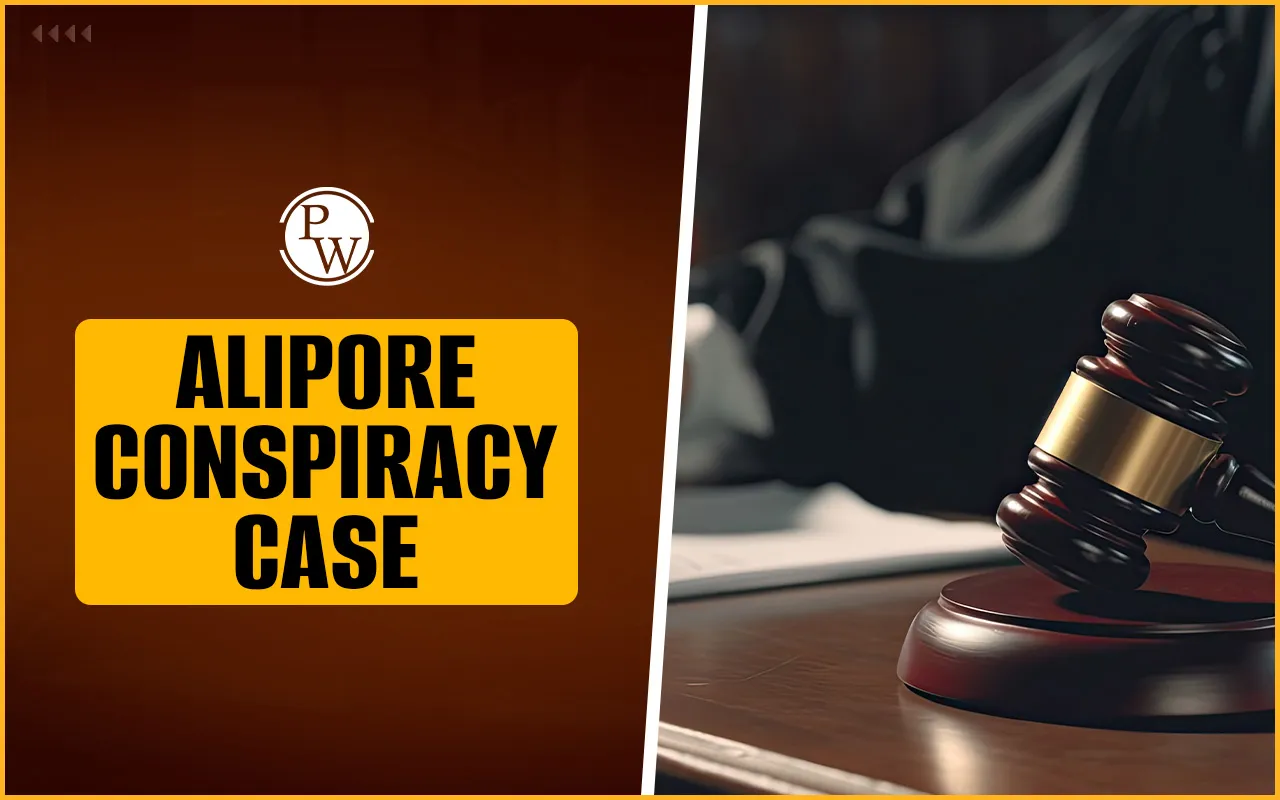
The Alipore Conspiracy Case was one of the most important revolutionary trials during India’s freedom struggle in 1908. It exposed how deeply Indian revolutionaries had started working against British rule. This case shook the colonial government and brought the idea of Indian independence into the spotlight. Many revolutionaries, including the famous Aurobindo Ghosh, were involved in the high-profile Alipore Conspiracy Case.
The Alipore Conspiracy Case 1908 is also called the Maniktala Bomb Case or "Emperor vs Aurobindo Ghosh and others". It was the first major trial involving Indian revolutionaries. It took place in Alipore, Kolkata, and exposed the operations of a secret group that aimed to overthrow British rule using violent means.
The case got attention across India and abroad as the British saw it as a dangerous sign of growing unrest. For many Indians, however, it proved that the youth were ready to sacrifice everything for freedom. This case marked a shift from moderate political protests to revolutionary actions and highlighted the deep role of ideology and nationalism during this period.
The history of the Alipore Conspiracy goes back to Bengal's growing unrest after the Partition of Bengal in 1905. This decision by the British angered the Indian population. The Swadeshi Movement started in response. But some youth believed peaceful protests were not enough.
One such group was led by Aurobindo Ghosh and his brother Barindra Kumar Ghosh. They started a secret society called Anushilan Samiti in Kolkata. The group trained young men in bomb-making, arms handling, and physical training. Their aim was to use revolutionary violence against the British government.
A bomb thrown at Judge Kingsford of Muzaffarpur on 30 April 1908 triggered the case. Though the target survived, two British women were killed. This event led to arrests and the start of the Alipore Conspiracy Case.
The Alipore Conspiracy Case date is closely linked to the Muzaffarpur bombing that occurred on April 30, 1908. Following this, the British government began arresting suspects. On May 2, 1908, the police raided the garden house of Barindra Ghosh, brother of Aurobindo Ghosh, in Maniktala, Calcutta.
The official trial began in Alipore Sessions Court on May 19, 1908, and continued until May 6, 1909. This one-year-long trial was the first of its kind in India as it involved detailed charges, secret evidence, and the use of the Indian Penal Code against revolutionaries. Over time, the trial became a platform to express their patriotic feelings and defiance for the revolutionaries.
The most prominent name among the accused was Aurobindo Ghosh. Alongside his brother Barin Ghosh and other members of the Anushilan Samiti, Aurobindo was implicated in a plot to challenge British colonial rule through armed rebellion. The British authorities arrested 49 individuals, most of whom were captured from Barin Ghosh's residence in Calcutta.
Also Read: Important Days in May 2025
The Alipore Conspiracy Case accused list included a total of 49 revolutionaries. These were mostly young men from Bengal, highly educated, and driven by the desire to free India.
| Name | Role in the Conspiracy |
| Barindra Kumar Ghosh | Organiser and revolutionary leader |
| Aurobindo Ghosh | Ideological mentor (later acquitted) |
| Ullaskar Dutta | Bomb maker |
| Hemchandra Das | Bomb instructor |
| Satyendranath Bose | Active member of the group |
| Kanailal Dutt | Killed an approver inside the jail |
| Satyendranath Basu | Involved in arms training |
| Prafulla Chaki | Died before arrest (Muzaffarpur bomber) |
| Khudiram Bose | Hanged for the Muzaffarpur bombing |
Here are some key facts related to the Alipore Conspiracy Case that make this trial historically important:
It was the first major political trial involving armed revolutionaries.
The case lasted almost a year and became a media sensation.
The British used spies and informers to trace the group.
The prosecution’s case weakened after the murder of Narendranath Goswami, a key witness who had turned informer, by Kanailal Dutta and Satyendranath Bose.
Chittaranjan Das gained fame as a lawyer by defending Aurobindo Ghosh.
Aurobindo was acquitted, while Barin Ghosh and several others were found guilty and sentenced to varying terms of imprisonment.
Also, the Alipore Conspiracy case marked a shift from soft protests to violent revolutionary nationalism.
The outcome of the Alipore case had a major impact on India’s freedom struggle. After the trial:
Aurobindo Ghosh was acquitted due to a lack of evidence.
Barindra Ghosh and Ullaskar Dutt were sentenced to death, later reduced to life imprisonment.
Kanailal Dutt was Hanged for killing the police informer
Several others received jail terms ranging from 7 to 10 years.
The British government intensified its surveillance of revolutionary activities.
After his release, Barindra Kumar Ghosh later became a journalist. Aurobindo Ghosh renounced politics and became a spiritual leader. But the revolution continued to grow in Bengal and other parts of India.
The aftermath of Alipore Conspiracy Case was significant. It had many long-term effects on India’s freedom movement:
Rise of revolutionary groups like Jugantar and Hindustan Socialist Republican Association (HSRA).
Aurobindo Ghosh’s acquittal inspired a new generation of thinkers and youth.
British intelligence became more active in tracking revolutionaries.
Jail killings like that of Narendranath Goswami showed the high tension inside prisons.
The trial shaped new legal strategies for both the British and the freedom fighters.
Though the British tried to suppress the revolution through this trial, it only added fuel to the fire. More youth came forward, inspired by the bravery of the accused.
In conclusion, the Alipore Conspiracy Case 1908 was a key chapter in India’s freedom movement that brought underground revolutionary activities into the national spotlight and inspired a whole generation of freedom fighters.
Want to explore more such historic topics and crack UPSC with confidence? Join PW’s UPSC Courses today!

UPSC Coaching